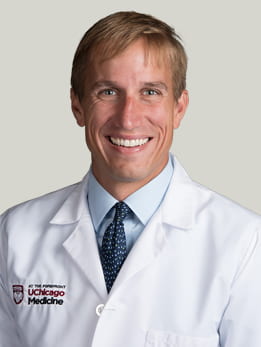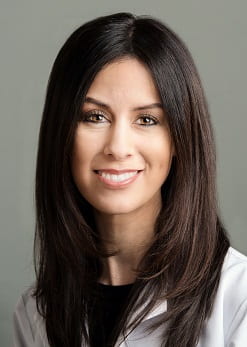
Hospitalist Scholars
Program Leaders

David O. Meltzer, MD, PhD
Fanny L. Pritzker Professor
Chief, Section of Hospital Medicine
Associate Professor of Economics and Public Policy
Director, Hospitalist Scholars Program

Micah Prochaska, MD
Assistant Professor of Medicine
Co-Director, Hospitalist Scholars Program
Associate Director, MacLean Center for Clinical and Medical Ethics

Clinical Instructor
Chicago ITM KL2 Scholar
Assistant Director, Hospitalist Scholar Program
About
As the field of academic Hospital Medicine matures, there are increasing expectations for leaders in the field to bring advanced scholarly skills as researchers, educators and clinical leaders. The slow development of these skills in the course of most academic positions has often delayed the professional development of academic hospitalists and opportunities for rigorous training in these areas have been limited.
In response to these needs, we created the University of Chicago (UC) Hospitalist Scholars program to help future academic hospitalists and other internal medicine doctors obtain the skills and experience necessary for successful scholarly careers in research, education or clinical leadership. The UC Hospitalist Scholars program is the oldest scholarly training program for hospitalists in the US, with about 40 graduates over the past 20 years and diverse faculty able to mentor in a wide range of scholarly areas. Many graduates of the Hospitalist Scholars program now hold academic positions at leading institutions across the US and have been recognized as leaders in their fields. The program includes 4 established pathways: Outcomes Research Pathway, Medical Education Pathway, Clinical Medical Ethics and Bioethics Pathway, and Global Health Pathway.
Hospitalist Scholars in all pathways typically participate in the program for 2 years during which they devote at least three quarters of their time to coursework and to a mentored project. Most scholars begin the two-year program with the intensive Summer Program in Outcomes Research Training (SPORT) during the summer of the first year. SPORT is an introduction to outcomes research and includes coursework and applied training in health services research methods, data, quantitative analysis, and applications. Many scholars also choose to complete one of <several options for a master’s degree>, for which courses can be spread out over two years. Examples of master’s degrees that scholars have completed in past years are provided below.
The hallmark of the Hospitalist Scholars program is the mentored scholarly project in which Hospitalist Scholars design and initiate an independent project. The most valuable element of this program is the close involvement of an experienced team of investigators and mentors to help each Scholar achieve their academic and career goals. A primary mentor provides supports in developing a mentorship team to help develop individualized goals and a timeline for the scholarly project and overall fellowship, select coursework consistent with those goals, and design, plan, implement and evaluate the project. <Interdisciplinary workshops and conferences> help Scholars hone scholarly skills, and enhance opportunities to interact closely with faculty from within and outside the university.
Clinical service is an essential part of an academic hospitalist’s career, and the Hospitalist Scholars program ensures sufficient time and bandwidth to experience a rewarding and stimulating practice during participation. Hospitalist Scholars typically have 3 months of inpatient clinical activity, including direct-care hospitalist, teaching, and general medicine consultation services, and off-hours admitting and coverage shifts. Clinical schedules are created to work around each Scholar’s academic and research needs.
Learning to share and disseminate work via presentation and publication is a highlight of the program. Scholars receive training to enhance their academic presentation and writing skills and present their work at the leading local, regional and national meeting. Scholars have published in some of the highest impact journals in their fields.
Clinical Service
Clinical service is an essential part of a career in academic medicine, and the Hospitalist Scholars program ensures sufficient time and bandwidth to experience a rewarding and stimulating clinical practice. A typical schedule includes about 3 months of inpatient clinical activity on the hospital medicine service at the University of Chicago, including a blend of direct-care hospitalist services, off-hours admitting and coverage shifts, time on the general medicine consultation service, and potentially attending on the University of Chicago Medicine Residency teaching services. Clinical schedules will be individually created to work around academic and research needs.
Mentored Research
The hallmark of the Hospitalist Scholars program is the mentored scholarly project in which Hospitalist Scholars design and initiate an independent project. The most valuable element of this program is the close involvement of an experienced team of investigators and mentors to help Scholars achieve their academic and career goals. A primary mentor provides supports in developing a mentorship team to help develop overall goals for the project, select coursework consistent with those goals, and design, plan, implement and evaluate the project. There are a variety of interdisciplinary workshops and conferences geared toward learning skills of critical analysis and research design, and additionally create opportunities to interact closely with faculty from both within and outside the university.
Learning to share and disseminate work via presentation and publication is a highlight of the program. Scholars present their work at the leading local, regional and national meetings in their disciplines, and their work has led to publication in some of the highest impact journals in our field. Participating in the Hospitalist Scholars program allows for a singular opportunity to learn this vitally important skill and prepare future academic hospitalists for personal and professional success.
History and National Recognition
The Hospitalist Scholars Clinical Medical Ethics Program combines two of the oldest and most well know training programs in the nation, the University of Chicago Hospitalist Scholars Research fellowship and the MacLean Center for Clinical and Medical Ethics fellowship. The Hospitalist Scholars Program and the MacLean Center each have nearly 3 decades worth of training post-doctoral learners, and many graduates from these programs have gone on to pursue successful academic careers and are now national leaders in their respective fields. MacLean Center graduates have gone on to direct ethics centers around the world, publish hundreds of articles in the field of clinical ethics, and hold more than 20 endowed university professorships. Graduates of the hospitalist scholars program have earned recognition through national awards from the American Heart Association, the Society of Hospital Medicine, and the Alliance for Academic Internal Medicine. Publications from scholars have appeared in numerous journals, including JAMA, NEJM, Annals of Internal Medicine, Archives of Internal Medicine, American Journal of Medicine, Journal of General Internal Medicine, Journal of Hospital Medicine and Academic Medicine. Hospitalist Scholars have also successfully received career development funding from the NIH, American Cancer Society, and American Heart Association and project support from the ACP Foundation, American Lung Association, and AHRQ.
Postdoctoral Fellow Status & Benefits
Scholars who are supported by federal training grants hold the title of a postdoctoral fellow. Postdoctoral fellows are not University employees and therefore do not receive benefits available to some University employees. In particular, they are ineligible for University of Chicago retirement plans or educational benefits, including University of Chicago Laboratory School or college tuition discounts.
The health insurance benefits for postdoctoral fellows are managed by Gallagher Insurance.
Vacation, sick and parental leave for postdoctoral fellows supported by training grants are covered by the applicable training grant rules. Kirschstein-NRSA fellows have provision for 8 weeks paid parental leave with approval from the Program Director. Either parent is eligible for parental leave. Hospitalist Scholars on paid (or unpaid) maternity leave have a proportional reduction in clinical expectations.
Taxes are not withheld from the stipend paychecks paid to fellows. Fellows are expected to make quarterly installments. Additionally, fellows are not issued a W-2 at year end.
Postdoctoral fellows are not to perform additional services and cannot be paid extra service payments for additional clinical work without prior approval from the Deans and Provost Offices.
Eligibility
The Hospitalist Scholars program is open to candidates pursuing careers in hospital medicine or general internal medicine as well as candidates who wish to complete research training prior to applying to other subspecialities.
How to Apply
To apply for a Hospitalist Scholars Clinical Medical Ethics, please visit the University of Chicago Academic Jobs website and click “Apply Now.”